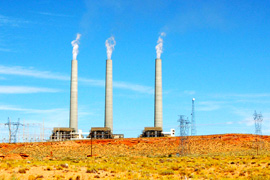Cronkite News has moved to a new home at cronkitenews.azpbs.org. Use this site to search archives from 2011 to May 2015. You can search the new site for current stories.
Court gives Salt River Project another chance to challenge Navajo suit
WASHINGTON – A federal appeals court said Thursday that the Salt River Project can challenge an Office of Navajo Labor Relations employment action over two tribe members who said they were fired “without just cause” from the Navajo Generating Station.
The utility and the power plant‘s operator, Headwaters Resources Inc., said the northern Arizona power plant is exempt from tribal enforcement under federal law and the 1969 lease for the land on which the plant sits.
But a U.S. District Court judge threw out that claim, ruling – incorrectly, the appeals court said – that the Navajo Nation is a necessary party in the case because it represents its general and economic interests. The nation was not named in SRP’s suit.
But it is not necessary for the nation to be included, said a three-judge panel of the 9th U.S. Circuit Court of Appeals, which ordered a new district court hearing for SRP and Headwaters.
Navajo officials are considering their option for a rehearing, said their attorney, or letting the case go “back to the district court for a decision on the merits of the case.”
“Needless to say we’re disappointed,” said Philip Higdon, of the Phoenix firm Perkins Coie. “We definitely feel the Navajo Nation should be a party in a case involving a contract in which the nation is a party.”
Higdon represents the director of the Navajo Labor Relations office, members of the Navajo Nation Labor Commission and justices of the Navajo Nation Supreme Court.
Attorneys for SRP and Headwaters did not return phone calls seeking comment.
The Navajo Supreme Court had ruled that the Navajo Nation had authority to enforce the Navajo Preference in Employment Act in this case, even though SRP and Headwaters argued the lease “extinguished all Indian uses of the covered lands,” the 9th Circuit opinion said.
The original lease says the tribe “will not directly or indirectly regulate or attempt to regulate the . . . construction, maintenance or operation” of the Navajo Generating Station, the opinion said.
“The federal common law governs whether an Indian tribe’s lease with a non-Indian has waived the tribe’s authority to regulate the non-Indian’s activities,” the opinion said. “It is well-settled that federal common law circumscribes a tribe’s inherent authority to regulate non-members.”
But the lease is being interpreted in different ways, said David Jordan, the attorney for the two tribal members fired from the power plant. The Navajo Nation argues the lease prohibits them from regulating the technical operation of the plant, but does not deprive them of their right to step in when injustices are committed against members of the tribe, he said. It creates “chicken-or-the-egg” question, Jordan said.
The federal government is saying it has the jurisdiction to decide whether the Navajo Nation Supreme Court can rule on the case, while the Navajo Nation feels the federal government does not have the power to review the ruling of the Navajo court, Jordan said.
“The Navajo government is sovereign, but it is a restricted sovereign. There are limits on its sovereignty,” Jordan said. “It’s kind of a tug-of-war between sovereign entities.”







